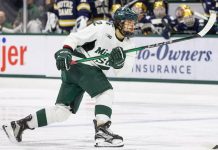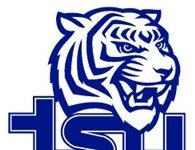ECAC commissioner Phil Buttafuoco today confirmed his conference’s commitment to following the NCAA’s points of emphasis in its leagues and in the conferences for which it assigns officials.
“We’re happy with the directive and we believe it’s going to lead to more exciting games, and, for the fans, shorter games,” said Buttafuoco in a conference call about the NCAA’s plan to open up the game. “We’re going to see the skilled players playing the game the way it was developed many years ago.”
While the Division I ECAC Hockey League has separated from the ECAC hierarchy, the conference still houses three men’s Division III leagues, the ECAC East, Northeast and West, and two women’s Division III leagues, the ECAC East and West. The ECAC also assigns referees for the other D-III conferences in the northeast, the SUNYAC and the men’s and women’s NESCAC. That gives the ECAC responsibility for officiating at about two-thirds of all college hockey games at the Division II and III levels.
Buttafuoco said that the goal is not to see more penalties. “We’re not asking the officials to make more calls; we’re basically asking the coaches and players to adapt.”
Buttafuoco was joined on the call by Paul Duffy, director of the men’s and women’s ECAC West leagues, and by George Starr, director of the men’s East and Northeast and women’s East leagues and officiating coordinator for the men’s ECAC East and NESCAC. In addition, Duffy has been the NCAA’s secretary-rules editor for the ice hockey rules committee for 17 years. The two directors were named to their new positions in July.
Duffy said that the NCAA rules committee had a strong directive from coaches and commissioners to change the culture in which the game was being played.
“In the last five years, the committee felt that hooking, holding, interference and impeding the progress of players had not only crept into the game, but was really taking over the game, and the skilled player was not able to get open and to score,” Duffy said.
That led to the committee’s decision to strictly enforce those rules, which the NCAA communicated earlier this year in an open letter to the college hockey community.
“Do we expect it to be painful to start with? Yes,” said Duffy. “But we are hoping that the coaches will start coaching away from hooking and impeding the progress of players and get back to … a more open-skating skill game, maybe like 10 years ago.”
The ECAC reviewed the points of emphasis and an NCAA-produced video with its officials at regional clinics at Fredonia, Utica, and Holy Cross prior to this season.
“We’ve told officials not to ‘overcall’ games, but to simply call what’s there,” said Starr, “and most specifically, we’ve told them that when they can clearly identify an advantage that’s been taken away by a defensive player on an offensive player, that must be called — regardless of the time of the game.”
The ECAC has also taken steps to make sure coaches and players are up to speed on the changes.
“We have assigned officials to go out and meet with the teams prior to this season,” said Starr, a common practice in Division I, but not done by the ECAC throughout the Division III level until this season. Officials have met in classroom settings with coaches and players, armed with the NCAA video and the NCAA’s statement on rules of emphasis.
Buttafuoco, Duffy, Starr, and other officiating coordinators will attend games regularly and will conference weekly to assess not only the performance of officials, as the conference has in the past, but also how coaches and players on individual teams adapt to the new style of play. Buttafuoco said that the conference will communicate directly with member institutions, “as to whether or not they are accepting the directive, and whether their style of play continues to lag behind those that are changing their style.”
Duffy said that he and Starr will be working with on-ice officials in their evaluations to make them better officials. “I think our job is to go in and say, ‘Okay, this is the new directive. Let us work with you. Use me as a resource,'” said Duffy. “We’re going to have more observers in the buildings this year, and it’s up to the observers to help the officials doing the game.”
But down the road, the conference won’t tolerate a “let them play” attitude from its officiating staff.
“What may not have been penalties in years past — due to the position of where the puck may have been, or the player if he’s in the neutral zone, or away from the play, or that kind of thing — if it’s a clear advantage we told them to take the penalty,” said Starr. “If they don’t take the penalties, they won’t be refereeing.”
So far, the ECAC believes coaches and officials are supportive of the new emphasis. Duffy, who saw two games last weekend, said that there were indeed a lot of penalties called, “But at the end, both coaches came up and said, ‘We will adapt.’ So that was encouraging.”
The first two non-exhibition games with ECAC officials were at Geneseo against Neumann last weekend, with two referees who have officiated in D-I national championship games, Tim Kotyra and Jeff Fulton. The two teams saw a combined 66 penalties and 63 powerplays over the two nights.
“It’s an ongoing process,” said Duffy. “We hope everyone gets on board.”


